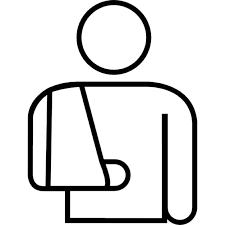Injured after an accident? Here’s what you may be entitled to receive

If you have recently been in a motor vehicle accident, then you understand that it is not always just a minor inconvenience as it’s often dismissed as. Sometimes, it becomes a turning point and might even feel like it has changed the trajectory your life was heading on. From chronic pain, mental health consequences, chronic stress, and/or an inability to work, everyone reacts differently to a motor vehicle accident.
If you’re a driver in Ontario, then you most likely are insured (we hope you do since it is required by law!). Under your insurance policy, after a motor vehicle accident, you might be entitled to various benefits as an injured insured person. There are different kinds of benefits available to you depending on the extent of your injuries, what aspects of your life has been affected, the way your life was prior to the accident, and many other factors.
Where do I start?
First, it is very important to note that most insurance providers do require that you get things started with an Application for Accident Benefits form, or an OCF-1, within 30 days from the accident. Although there might be exceptions, it is always better to be safe than sorry! Get your foot through the door if you are starting to feel that you might be significantly impacted by the accident within those 30 days.
Medical-Rehabilitation Benefits
One benefit that you may be entitled to regardless of whether or not you were deemed to be at fault, are medical rehabilitation benefits. Depending on what category you’re placed in, you may be entitled to a minimum of $3,500 to a maximum of $1,000,000. If you are wanting to claim this benefit, it’s very important to simply provide information. Keep your insurer up to date on your treatments and health.
Income Loss Benefits
In terms of income loss as a result of an accident, you may be entitled to EITHER income replacement benefits or non-earner benefits. Key word here would be either. You cannot claim both of these benefits because the criteria for one excludes the other.
You may be entitled to income replacement benefits if you were employed at the time of the accident, were employed within at least 26 weeks in the 52 weeks prior the accident or are self-employed. In all three criteria, you must not be able to return to the work you were doing within 104 weeks of the accident. This benefit is payable as long as you pass the insurer’s tests of disability. The questions asked during these tests are generally whether you are significantly disabled from completing the job you had prior despite being educated, experienced, and trained. In other words, the only thing preventing you from being able to work are your injuries.
Non-earner benefits might be available to those were unemployed, retired, or a full-time student at the time of the accident. To be eligible to receive this benefit, you would have to demonstrate that you have suffered a complete inability to carry on the life you were leading prior to the accident (i.e., there is a significant difference between pre-accident and post-accident activities). Once you prove that, you might be entitled to $185 per week. If you continue to demonstrate a complete inability even after 2 years from the accident, it increases to $320 per week. PRO TIP: Social media may really come in handy in proving that the accident has changed your life!
Attendant Care Benefits
Attendant care benefits are provided to those who have proven to be so injured that they are unable to perform the tasks they were able to do in order to take care of themselves. In these cases, the insurer would provide a caretaker to help you look after yourself while you recover from your significant injuries. Something to keep in mind here would be your insurer will likely request an examination before considering providing this benefit. For example, if you are claiming that, due to your psychological injuries, you are unable to drive and so will require someone to drive you around. In this case, your insurer might request a psychological examination.
Optional Benefits
Finally, if you have purchased optional benefits or are deemed to be very significantly injured, you may be entitled to receive caregiver and housekeeping benefits. As the name implies, the caregiver benefits are reserved for those people that used to be the main caretaker of someone but are unable to continue caring for them and are in need of a third party to take over. Housekeeping benefits are designed to reimburse the insured for expenses incurred as a result of having to hire someone to help with house cleaning and home maintenance activities.
If you are feeling overwhelmed and confused trying to figure out your benefit entitlements, contact an experienced personal injury lawyer who can assist and advise you regarding next steps.
DISCLAIMER
The material provided on this website is for general information purposes only. It is not intended to provide legal advice or opinions of any kind. No lawyer-client, advisory, fiduciary or other relationship is created by accessing this website or reading its materials.
